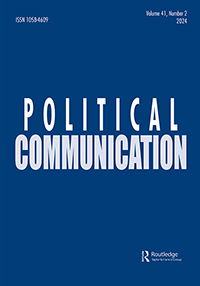The Media and Democratization: A Long-Term Macro-Level Perspective on the Role of the Press During a Democratic Transition
IF 5.1
1区 社会学
Q1 COMMUNICATION
引用次数: 0
Abstract
ABSTRACT The media are assumed to play a key role in democratization. Much of the available evidence on the media’s role in democratic transitions is based on a comparative and global perspective, focusing on rather recent key political events. Although democratization is conceptualized as a process that occurs over a long time, there is limited longitudinal evidence. Focusing on Austria, we used a long-term macro-level perspective ranging from 1816 to 1932, including the transition from authoritarian rule (monarchy) to democracy (republic). Grounded in previous research on the demonstration effect, we investigated whether the press contributed to democratization processes. Content-analytic data on the Vienna-based press were used to assess the salience of the idea of democracy in the press for each year of the observation period: How much did the press report on democratic ideals, such as freedom or equality? The level of democratization was assessed using three available longitudinal measures of democratization. Using autoregressive integrated moving average (ARIMA) modeling to account for autocorrelation and the trend in the time series, we show that there was a covariation between increases in the salience of the idea of democracy in the press and increases in the level of democratization. Furthermore, we found that a higher salience of the idea of democracy in the press in a given year “Granger-caused” (i.e. prospectively predicted) future increases in the level of democratization. Although we acknowledge the limitations in terms of causal interpretations, these findings are consistent with the idea of a long-term macro-level media effect.媒体与民主化:从长期宏观层面看新闻在民主转型中的作用
本文章由计算机程序翻译,如有差异,请以英文原文为准。
求助全文
约1分钟内获得全文
求助全文
来源期刊

Political Communication
Multiple-
CiteScore
13.90
自引率
2.70%
发文量
30
期刊介绍:
Political Communication is a quarterly international journal showcasing state-of-the-art, theory-driven empirical research at the nexus of politics and communication. Its broad scope addresses swiftly evolving dynamics and urgent policy considerations globally. The journal embraces diverse research methodologies and analytical perspectives aimed at advancing comprehension of political communication practices, processes, content, effects, and policy implications. Regular symposium issues delve deeply into key thematic areas.
 求助内容:
求助内容: 应助结果提醒方式:
应助结果提醒方式:


